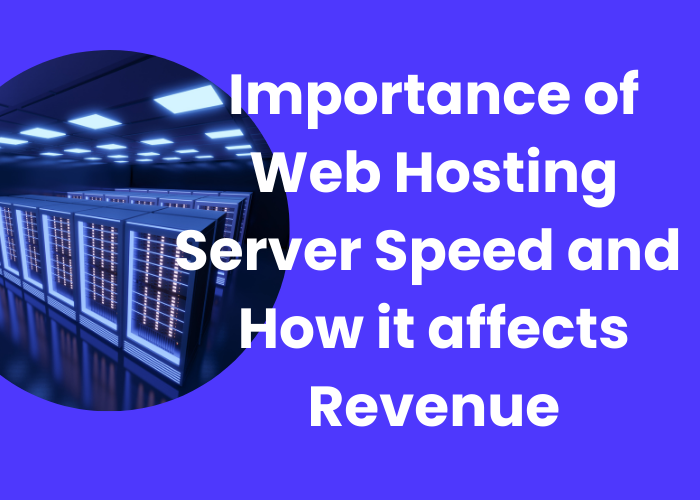
In this digital era, the internet is the most important part of human life. As people incline more and more towards the Internet, so do the brands. With the help of the internet, brands are going global with their websites.
It is easier to do business online these days than to set up a shop that restricts the reach of the brand. If a brand is solely dependent on digital marketing for revenue, it is really important that they have a working website with a decent speed.
And the speed of a website depends on the quality of the hosting server. The quality of the server increases as people upgrade from a free server to a shared hosting to a dedicated hosting. Although costly, dedicated hosting provides the highest speed.
It is very important to understand that the revenue generation is directly proportional to the speed of the website which means a slow website literally chokes revenue to a slow death.
According to many online surveys, website loading speed matters a lot while bringing traffic and catching attention. People do not have time to wait for a slow website to complete loading and lose interest and move on to a different website.
This is bad for business. Needless to say, slow-loading websites have a bigger bounce rate and poor sales. A window of 3 to 6 seconds is all a customer will allow on average for the website to load completely.
After that, the customer would lose interest and move on. This decreases the sale and leaves negative reviews about the website which will have a long-term effect on the website. It is a matter of mere seconds that converts a viewer into a customer or turns them away forever.
Website Speeds and their Effects on Sales

Research shows that almost a whopping 40% of customers leave the website if its process is slow. That means for every 100000 customers, 40000 leave and never come back. It has long-term effects on the sales of that company. Plus google uses the speed of a website as a ranking factor.
It is much more common for bigger brands to increase the selling rate by simply reducing the loading time. As per the survey, a brand increased its sales by 12% when it reduced the loading time from 6 seconds to 1.2 seconds. Google usually keeps a list of websites and their performance data which includes the loading time of the website.
Let’s have a look at the ranges of loading times and their effects on sales.
- Less than 3 Seconds
If the brand wants the customer to come and stay, the unofficial rule book states the loading time should be less than 3 seconds. This is only possible when the server is strong and fast.
- 3 to 5 Seconds
If the loading time is between 3 to 5 seconds, there is a fair chance that the website will be seen.
- 6 to 10 Seconds
Within the range of 6 to 10 seconds, the chances are sparse but not gone completely. This is a borderline case.
- More than 10 Seconds
If the website takes longer than 10 seconds to load its contents, there is no hope left. Not only is the chance of conversion really low in these cases, but the website ranking also takes a nosedive. Additionally, the review gets really bad.
There are certain performance measurement tools available in the market. These tools can be used to measure the performance of the website and could make suggestions to improve it. Then the brand can contact its developers to tweak the codes of the website to increase its speed and performance. Although a powerful server makes the ultimate difference in speed and performance.
Impact on Conversion Rate
The download and rendering time of a website is important for Customer Conversion. A conversion rate is a rate at which a customer performs a measured or desired action. For example, a conversion could be a customer purchasing something from the website or subscribing to a newsletter, or reacting to an article. All of these are considered conversions depending on the goal of the brand running the website.
Performance impacts conversion. A site visitor expects the site to be completely loaded within 2 to 3 seconds. Otherwise, there is a huge chance that visitors might abandon the website looking for a faster alternative.
Building a website requires tools such as HTML, CSS, and JavaScript, typically including binary file types such as images and video. The decision a developer makes and the tools he/she uses greatly affect the finished work.
Good performance is definitely an asset. The bad performance will most likely be a liability. Website speed directly affects bounce rates, conversion rates, revenue generation, user satisfaction percentage, and search engine ranking.
Tracking the performance of a website is important. Multiple factors such as network speed and capability of the device affect the performance of the website.
There is no single performance metric to measure, and differing business objectives may mean different metrics are more relevant to achieving the goals of the website or the brand that the website supports. The best way the performance of a website is perceived is through user experience.
Importance of a Fast Server for Faster Loading Websites

The architecture of the website, hosting server, and database are really important deciding factors for website speed. The type of hosting server being used can either upgrade or downgrade the speed of the server. There are two types of hosting services available; shared hosting and dedicated hosting.
Shared Hosting: Shared Hosting is relatively cheaper than its counterpart but a shared server hosts multiple websites at the same time. It provides a moderate speed to the websites it’s hosting. As a result, websites with little to moderate traffic could be easily handled via shared server hosting.
Dedicated Hosting: Dedicated Hosting, on the other hand, means the server is only serving one particular website. High speed, better infrastructure, better performance, and more resources lead to higher traffic for the website. However, the service of dedicated hosting is a lot higher than that of a shared server.
The former has a dedicated technical support team to fix it. Still, a lot of brands are choosing dedicated hosting over shared ones due to the speed it provides. This results in increments in terms of traffic, customer conversion, and revenue generation. This is what matters at the end of the day, plus the search engine rank increases a lot.
What are the Factors Affecting the Speed of a Hosting Server?
There are two things that decide the speed and performance of a hosting server.
- Hard Drive
A Solid State Hard Drive provides a faster and more reliable service compared to standard hard drives. This helps with a faster loading time of the webpage and the overall performance.
- Resources
The more memory a server has the faster or better it will perform. To that end, having more RAM works wonderfully. The same thing goes for the bandwidth. Combined, they add more speed and power to the server which increases the speed of the website. A dedicated hosting or VPS Hosting is ideal for this kind of tweak.
Why Dedicated Server is better for a Website?
The single-tenant infrastructure with huge amounts of storage space and great processing power makes sure the business never shares the resources with others. Another major plus point is that multiple sites and applications can be operated with hyper-fast network speed and zero lagging. And the added security is a blessing. And as the business grows, the importance of dedicated servers increases.
There are two types of dedicated server hosting or web hosting. They have Managed Dedicated Server Hosting and Unmanaged Dedicated Server Hosting. The managed one comes with an entire team of technical support guys who will monitor, maintain and fix the server and related things.
Also read, How To Handle Heavy Traffic On Your Website?
Usually, it costs a lot to manage dedicated server hosting. On the other hand, the unmanaged one doesn’t have a technical team and needs to be handled by the business customers themselves.
- Fully Managed Server
A fully managed hosting is assigned to a client to fulfill all their requirements. But in this case, the technical support team is provided by the service provider who supplied the server. The client does not have to manage the day-to-day management, monitoring, and maintenance of the server on their own. All these will be performed by experts from the service provider’s end.
Since VPS hosting comes with its own technical team there is no need to have an in-house team on the client side. Plus the technical support team takes care of the security part of the server too.
This means a hassle-free daily operation for the client without any maintenance task to be performed by them.
That being said, a fully managed web hosting service usually puts a bit of restraint on the client’s operation due to its flexibility. This is the only downside apart from the money that the client has to spend on the server and the support team.
All in all, it is only recommended for the clients to go for a fully managed server, if they have no prior experience in handling server maintenance or if they have no time to do it.
- Self Managed Server
A self-managed server comes with all the perks and advantages of a fully managed server. However, the only missing piece is the lack of a technical support team from the service provider’s side to handle the day-to-day activities on the server.
However, it’s not as big a con as people might think. The lack of a technical support team from the service provider’s side means the client has full control of all admin tools of the server leading to even a higher security level than that is provided by a fully managed server. The only thing required is a team of in-house experts to handle the work related to the server.
Unlike a fully managed server, the self-managed server will not provide a smooth experience in terms of performance and stability as the in-house technical support team might not be as experienced as the team the service provider would have provided. This somewhat reduces the flexibility of the self-managed server.
Final Thoughts !!!
Well, it can be said that the loading speed is important for revenue generation and dedicated server hosting is the best way to do it. But there are certain things such as expected traffic, financial strength, etc. that are deciding factors to bring in a dedicated server or a shared server. Both provide a certain amount of speed and reliability but further scalability should be an important part of the bargain.
 Register
Register
